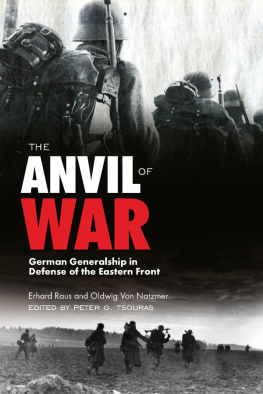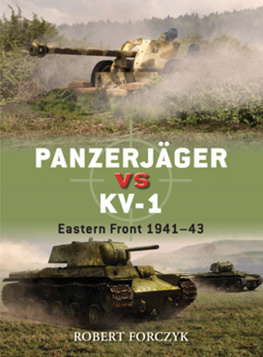THE ANVIL OF WAR
A Greenhill Book
First published in 1994 by Greenhill Books, Lionel Leventhal Limited
www.greenhillbooks.com
This edition published in 2016 by
Frontline Books
an imprint of Pen & Sword Books Ltd,
47 Church Street, Barnsley, S. Yorkshire, S70 2AS
For more information on our books, please visit
or write to us at the above address.
Copyright Peter Tsouras/Lionel Leventhal Limited, 1994
ISBN: 978-1-84832-870-9
All rights reserved. No part of this publication may be reproduced, stored
in or introduced into a retrieval system, or transmitted, in any form,
or by any means (electronic, mechanical, photocopying, recording or otherwise)
without the prior written permission of the publisher.
CIP data records for this title are available from the British Library
Publishing History
The Anvil of War comprises three U.S. Department of Army publications that have been
adjusted for this edition, with an Introduction by the Editor: Military Improvisations
during the Russian Campaign , Department of the Army pamphlet no. 20-201,
Washington D.C., August 1951; German Defense Tactics against Russian Breakthroughs,
Department of the Army pamphlet no. 20-233, Washington D.C., October 1951;
and Operations of Encircled Forces: German Experiences in Russia , Department
of the Army pamphlet no. 20-234, Washington D.C., January 1952.
Printed and bound by CPI Group (UK) Ltd, Croydon, CR0 4YY
Introduction
Greenhill Books has gathered three of the most brilliant distillations of the German experience on the Russian Front into this single volume, The Anvil of War. These three monographs: Military Improvisations During the Russian Campaign, German Defense Tactics against Russian Breakthroughs, and Operations of Encircled Forces, written by experienced German general officers, under the aegis of the U.S. Army after World War II, represent the German attempt to deal with the increasingly effective use of massive numerical superiority by the Soviets when the tide of war had turned. The Soviets had become the hammer and the Germans the anvil in the last half of the war. This then is the story of the German Army in adversity. Although ultimately doomed to defeat, the German retreat from Russia was conducted with skill and heroism against incredible odds. Upon his return to Moscow by car after the Potsdam Conference, a senior American diplomat noted that his route followed the retreat of one of the main German armies and was littered with the debris of war. But repeatedly he would see the same scene: one or two burnt-out German tanks in defensive positions with arcs of twenty to thirty destroyed Soviet tanks arrayed around them. The authors of The Anvil of War, Erhard Raus and Oldwig von Natzmer, fought through this very ground. Only in 1990, in the full glare of glasnost, did the Soviet General Staff announce its true military losses of the war, an incredible 8,668,400 dead and eighteen million wounded, grim testimony to the achievements of the German soldier in both the offense and defense.
I first came across the three monographs gathered in this new edition as The Anvil of War in early 1971 while serving as a young armor officer in the First Battalion, 64th Armor Regiment (3rd Infantry Division), stationed at the old Hindenburg Kaserne (Harvey Barracks), in Kitzingen am Main, West Germany. Published as Department of the Army pamphlets, they had lain untouched in my company commanders office for ages, it seemed, from all the dust I disturbed when I pulled them out of the bookcase. Being something of a Germanophile at the time, I was fascinated by these little gems of history. As I read on, it was obvious that the distilled experiences of German generals on the Russian Front were of such immediacy to our present mission (the victors of Stalingrad, the 8th Guards Army, were just forty kilometers east of us) that I wondered why they were so little known. After all, the Soviet Armed Forces were in the full flood of expansion, preparing for the great Theater Strategic Operation (TSO) meant to carry them to the Channel and the Pyrenees.
About the Authors
The first two monographs, Military Improvisations During the Russian Campaign and German Defense Tactics against Russian Breakthroughs, were written chiefly by Generaloberst Erhard Raus, originally an Austrian Army officer, transferred to the Wehrmacht along with so many others after the Anschluss in 1938. Raus served on the Russian Front and the subsequent retreat into northern Germany. Raus record in command, especially after the middle of 1943, is a remarkable saga of a skilful fighting retreat against an enemy flood tide which he repeatedly delayed, halted, or drove back with a variety of deadly ripostes and improvisations. Raus was a man who could quickly grasp a situation and then act decisively, employing speed and shock, the troika of qualities of the great commander, as defined by Suvorov. He was also an extremely cool-headed officer, a characteristic much-remarked by subordinates and superiors alike. The variety and mix of means he employed to frustrate repeatedly the Soviet steamroller showed also a mind open to new ideas.
Raus initially commanded the 4th Panzergrenadier Regiment of 6th Panzer Division in XLI Panzer Corps Drive on Leningrad in the late summer of 1941. His command, assisted by elements of the Brandenburger (special operations) Regiment seized the twin bridges over the Luga River at Porechye on 14 July, one of the last remaining obstacles in front of Leningrad. By the end of August, he was commanding the 6th Rifle Brigade as the Germans reached the outer defenses of the city. He was subsequently given command of 6th Panzer Division. In early December 1942, 6th Panzer was resting in France when it was hurriedly returned to Russia to take part in the attempted relief of the 6th Army at Stalingrad. Although the relief failed, the 6th Panzer Division under Raus acquitted itself with skill and style, an impressive achievement for a division that had been pulled suddenly from the cozy plenty of France to the frozen hell of Stalingrad.
After the Soviets frustrated the relief of 6th Army, they launched a major attack westwards to drive the Germans further from the beleaguered Germans in Stalingrad. The spearhead of 1st Tank Army overran the great supply and communications centre at Tatsinskaya, a bare 130 kilometers to Rostov. If it should lunge that much further the whole German position in the southern Soviet Union would collapse. Raus and 6th Panzer rode to the rescue and snapped the spearhead of the 1st Tank Army, destroying its lead corps and recovering Tatsinskaya. Paul Carrell describes Raus night attack:
And now General Raus opened the nocturnal tank battle between Maryevka and Romanov. The enemy, held up frontally, was attacked from both flanks and in the rear. The Russians were taken by surprise and reacted confusedly and nervously. Raus, on the other hand, calmly conducted the battle like a game of chess.
















